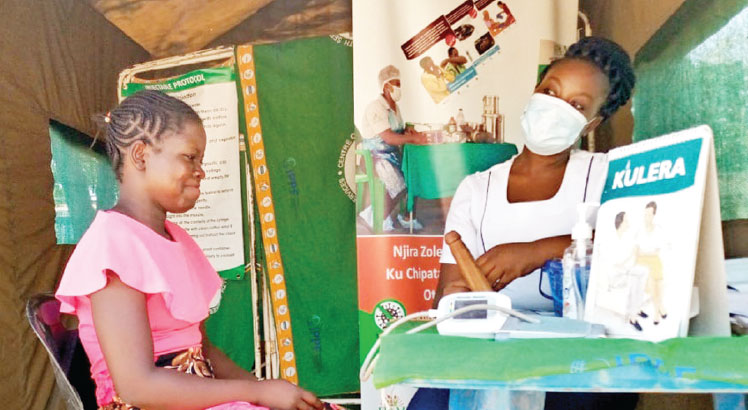Youths take control of their sexual health
Clad in a checkered skirt and white T-shirt, teen mother Lonely Kadam’manja does not want another unplanned pregnancy.
From a classroom floor at Chimutu on the outskirts of Lilongwe City, the free-speaking member of the Mataka II Youth Club explains how she dropped out of school after falling pregnant at age 16.
Kadam’manja, from Mtchoka Village in Traditional Authority Chimutu, became destitute when the age mate who impregnated her denied responsibility.
“I was miserable as my brothers expelled me to follow the boy who wanted nothing to do with the pregnancy, saying my parents shouldn’t be feeding another man’s baby,” she explains.
This personifies the agony of thousands of adolescent girls in the country.
Three in 10 girls fall pregnant before their 19th birthday, according to the Malawi Demographic and Health Survey of 2015.
Kadammanja returned to school and re-enrolled in Standard Seven after giving birth eight years ago.

During the club meeting, the 24-year-old shared with her peers how tomato and potato sales helped her complete her education at Malikha Community Day Secondary School (CDSS).
She said the business that paid her Form Four tuition was financed by borrowings and dividends from the club’s savings and loans group.
Using the profits, she constantly travels to Chiwamba Health Centre to collect contraceptives for the youth community-based distribution agents in her area.
Kadam’manja is one of the peer educators trained by Her Future, Her Choice (HFHC) Project funded by Global Affairs Canada.
The project is jointly implemented by Oxfam in Malawi, Centre for Alternatives for Victimised Women and Children, Point of Progress; and Family Planning Association of Malawi.
It targets 20 000 young and adolescent people to demand and access sexual and reproductive health (SRH) services and commodities.
Kadammanja’s hope, self-esteem and peace of mind were restored when her peers invited her to join the youth club.
The seller of farm fresh produce now supports her Standard Four child, parents and siblings.
Thanks to financial independence and SRH awareness, Kadam’manja now feels safer from the threats of gender-based violence, including sexual exploitation.
Nizia Julayi, from Matapa Village in T/A Malili, felt similarly dejected three years ago when the man who impregnated denied responsibility.
The 22-year-old was in Form Two at Ngowe CDSS at the time.
Malili Youth Club members encouraged her that teen pregnancy is not a dead end.
Through HFHC trainings and youth club meetings, Julayi learnt about the benefits of contraceptives and decided to have a Norplant implanted in her upper arm. The family planning chip protects her from unintended pregnancies for five years.
Now a peer educator, Julayi goes door to door sensitising the youth to the dangers of teen pregnancies and distributing condoms and contraceptive pills to her interested peers.
The community distribution agents and peer educators are credited with increasing the use of family planning services among the youth.
“Previously, there was some resistance, myths and misconceptions. Many feared that family planning would make them infertile, which is false,” Julayi explains.
Isaac Kaludzu, a community distribution agent from Chalira Village in T/A Njewa, says the youth are increasingly accessing family planning methods close to where they live.
“Many sexually active young people approach us for contraceptives, so the number of unplanned pregnancies and school dropouts is decreasing,” he says.
Service providers in neighbouring health facilities were also trained to provide youth-friendly SRH assistance, including information and modern family planning.
Mataka II Youth Club chairperson Ronald Bickton finds it pleasing that most adults in the rural community no longer despise the youth accessing SRH services as promiscuous.
He explains: “Mindset change is crucial because young people used to fear a backlash from adults, especially parents. This, together with the myths and misconceptions, is disappearing.
“With improved access to youth-friendly health services in health facilities, boys and girls freely seek these services and counselling.”
Tamandani Tambala, the clinician in charge of Chitedze Health Centre in the district, says the rising uptake of family planning services is rolling back teenage pregnancies.
Point of Progress rallies the youth to demand family planning services from their trained peers and target health centres.
Point of Progress HFHC programmes manager Sekanawo Mwatibu is happy that the youth are increasingly demanding SRH services to safeguard their health and futures.
“Previously, people didn’t know anything about sexuality education, but now they can assess their needs and access the desired services from the health centres and community distribution agents,” she says.
Oxfam project coordinator Rejoice Kankhande is excited that more young people now know their SRH rights and access to family planning services is no longer a taboo.
However, she is worried about stock-outs of family planning methods.
“We have created demand and built the capacity of health service providers, but stock-outs discourage the youth who go to the facilities and return home empty-handed,” Kankhande bemoans.





